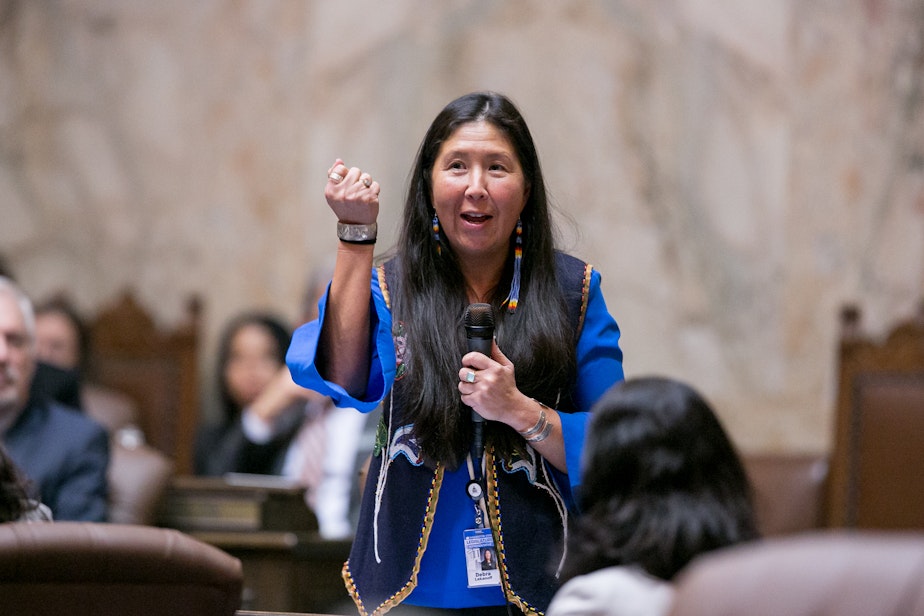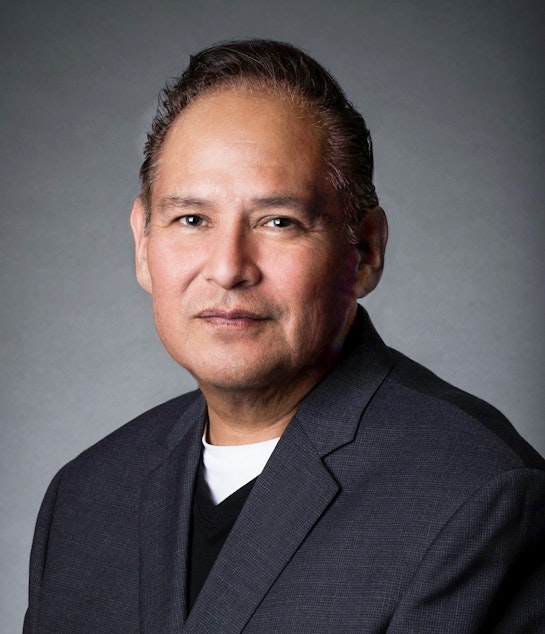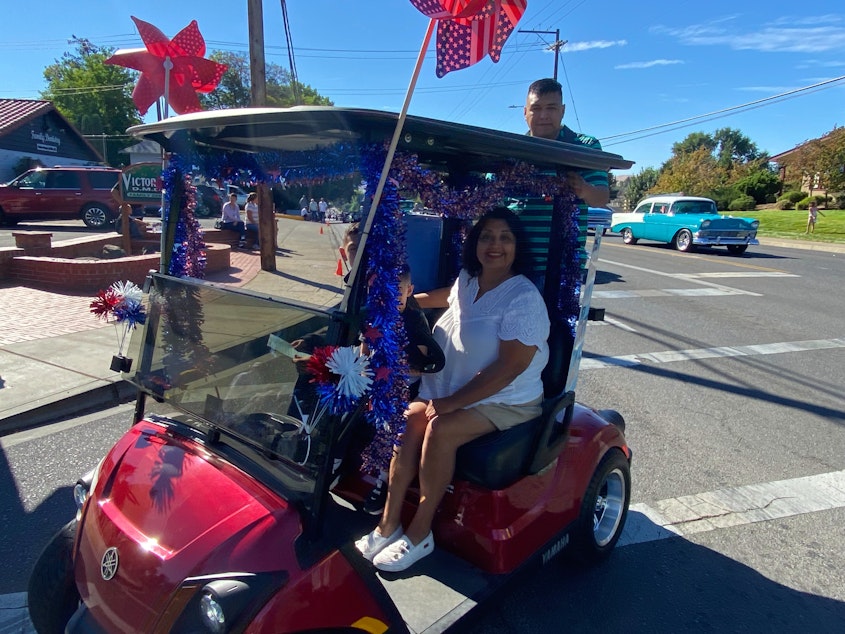Tribal representation in Olympia could quadruple this November

Currently, there is just one Native American serving in the Washington state Legislature. Debra Lekanoff, whose Indian name is “Xixch’I See,” is a member of a Tlingit tribe in Southeast Alaska.
She represents District 40, Position 1, which includes the San Juan Islands, and is running against a write-in candidate this fall.
And, after the elections on Nov. 8, Lekanoff might not be the only Native voice in the statehouse.
A handful of Indigenous candidates are running for legislative seats this fall, one in the state Senate and three, including Lekanoff, in the House.
Lekanoff, like all the candidates KUOW interviewed for this story, said her job is to represent her entire district. Nevertheless, she also said having Native lawmakers in the room in Olympia is important, pointing to some of the many bills that she’s championed, including one to create a first-in-the-nation statewide alert system for missing Indigenous people, and another to ban Native American mascots in public schools.
“It's a lonely time. No one clearly understands the angle you are coming from in different areas of policy and lawmaking, and in bringing in a Native American voice,” Lekanoff said. More voices with more perspectives that reflect the diversity of the Native community are also needed, Lekanoff said.
A second Native person running this year is Chris Stearns of the Navajo Nation, who currently serves on the Auburn City Council. Stearns, who is running for a house seat in the 47th, says if all the Native candidates running this year win, including him, that political power could make a big difference in a state where tribal concerns have too often taken a back seat.
“If you're overlooked, things that matter to you that really are important, they don’t get heard. The problems don’t get fixed,” he said. Sterns pointed to specific failures, like when tribes including the Yakama Nation sued the state to protect salmon runs after lawmakers failed to act.
Sponsored

The issue was culverts, which act like tunnels to let streams flow under roads but often block salmon from spawning. In 2018, the U.S. Supreme Court affirmed a lower court ruling that the state must repair or replace culverts that hurt salmon runs.
In Central Washington, candidate Laurene Contreras said salmon and environmental issues are key for Native and non-Native voters in the 14th District, where she’s running this year. Contreras, whose Indian name is Tnumpyk, is an enrolled member of the Yakama Nation. This fall she’s running as an independent for a seat in the Washington state House.
If she wins, Contreras will be the only member of a Washington tribe in the state Legislature.
“I think it's important to have that representation because it hasn't really been there,” she said.
Sponsored
She pointed, in part, to history. In a treaty signed back in the 1850s, the Yakama ceded more than 12 million acres of land to the federal government. The reservation today lies on around one million acres, but the Yakama retained hunting, gathering, and fishing rights on their historic territory.
Contreras sees her bid for office this year as linked to that history, those treaty rights, and tribal sovereignty, or the right to self-governance for tribes.
“I'm a sovereign member of the Yakama Nation, and that's important to me, because I'm representing not only our community, but our ancestors and the sacrifices that they made,” she said.
Today, Contreras works as a tribal manager for environmental issues including the Hanford nuclear cleanup. One place where she and her opponent disagree is on proposals to remove some dams on the Columbia River system to help save struggling salmon runs.
“When the dams went in, it did affect our people. My family grew up along the Columbia River, fishing,” Contreras said. “It's had an impact within the communities, even gathering for our own winter use, because that's our tradition.”
Sponsored
Conservationists, including Contreras, say removing four dams on the lower Snake River would make it easier for salmon that tribes and others depend on to get to where they need to go to spawn.

Her opponent in the race for the 14th Legislative District, Position 1, incumbent Republican Chris Corry, told KUOW he does not support dam removal.
“From a climate perspective those dams are important," Corry said. "It's not just about the water, and the power. It's also about moving our wheat from our Eastern Washington fields to the ports.”
Corry, who is not Native American, said the issues he’s focused on this election, like crime and inflation, are key to all the voters in his district, including tribal members. He also pointed to his track record, working “closely with my tribal partners.”
Sponsored
“They're with me in Olympia," he said. "I visit with them when I'm not in session.”
As it turns out, the Yakama Nation has endorsed both Corry and Contreras. The Yakama did not respond to KUOW's request for comment on that dual endorsement, which came as a disappointment to Contreras.
One possible factor: Corry looks more likely to win based on the August primary results that put him 37 percentage points ahead of Contreras.
“If someone is going to win, it’s better not to poke a stick in their eye,” said Washington state political consultant Ron Dotzauer, who added that he is not familiar with this specific race.
A fourth Native candidate running this year is Claudia Kauffman of the Nez Perce Tribe. She's running for the Senate seat in the 47th district, which she previously held. Her opponent, Republican Bill Boyce, was the first Black councilman to serve on the Kent City Council.
Sponsored
Now it's up to voters in the 14th and the other legislative districts to decide.
CORRECTION 10/27: An earlier version of this story incorrectly stated that Debra Lekanoff is running unopposed this fall. In fact, she will face a write-in candidate in the general election.
Want to know more about the voting records and issue positions of candidates? Use the VoteSmart tool below to find out more.




